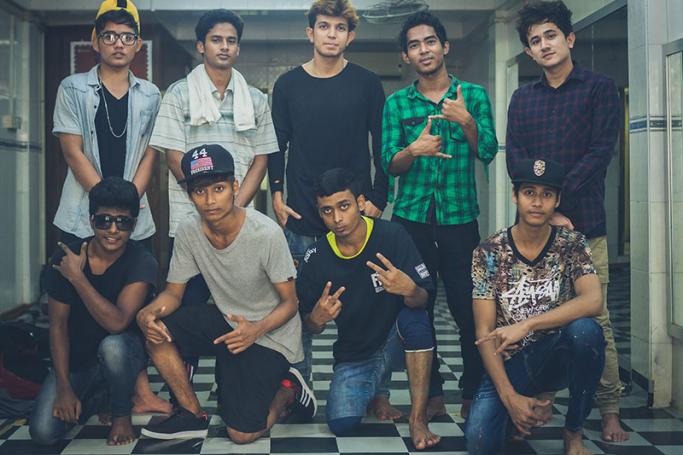“YouTube is the best teacher,” Kyaw Myint said, while sitting cross-legged on the linoleum floor of his b-boy group’s dance studio in Yangon’s Kan Taw Ka Lay Ward.
Kyaw Myint and his group, known as B Crew, credit the liberation of the telecommunications industry in Myanmar in 2014 with the growth of hip hop culture and b-boying in the country, making online resources, such as YouTube, widely and cheaply available among urban youth.
B Crew, like other upstart groups of b-boys and b-girls in Yangon, got their first taste of hip hop culture from scouring roadside DVD stalls for recordings of international dance competitions. Attracted to some of the more physical dance moves, such as flares and windmills, Kyaw Myint and his friends, including the founder of B Crew, Ko Phyo, began imitating the dances on their own.
They soon turned to the Internet in their thirst for more dance videos, renting out computers at local cyber cafes one hour at a time. The process was painstaking and expensive. “There are no words to describe how slow the Internet was,” Kyaw Myint said, adding that paying for online access took up almost all of their allowance as students.
Everything changed in 2014, however, when Telenor and Ooredoo began their telecommunications services in Myanmar. With the advent of affordable smartphones, cheap SIM cards, and faster data packages, the b-boys could download videos quickly and cheaply, and without having to be at a specific location.
“All of us have smartphones now,” Kyaw Myint said, and several of them quickly demonstrated by pulling out their devices and loading dance videos on their screens.
The explosive growth of the telecommunications industry in Myanmar since 2014 is almost unprecedented. In a report published in 2016, Roland Berger, the German consulting firm that assisted the Myanmar government in the telecommunications tendering process, said “within a few years, mobile penetration rates skyrocketed from 7 percent of the population to more than 90 percent.”
One result of this rapid increase in Internet access was that people in Myanmar could now seek out and find online resources that had previously come at a much higher cost. For those whose passions were largely kept underground and out of the mainstream, such as B Crew and other hip hop enthusiasts, it was a godsend.
The Internet and social media platforms, especially Facebook, has also allowed dancers and groups to find and connect with one another, as well as promote themselves and their art form to a wider audience.
“We upload everything,” Kyaw Myint said, and to positive effect. Mainstream awareness and acceptance of b-boying has grown in recent years, with regular contests and performances in malls and other public spaces on special occasions.
Still, the members of B Crew feel that much more could be done to support dancers here, bemoaning the lack of resources and strategy in promoting the art.
“India started after us, but they have more support and now they have surpassed us,” Kyaw Myint said. He added that b-boys in Myanmar feel neglected and ignored by much of the international b-boy scene as well, saying, “International b-boys don’t come to Myanmar and do workshops, like for other countries.”
As of now, the odds of a career as a b-boy in Myanmar are slim to none, and Kyaw Myint and the other group members all have other jobs, such as taxi driver, teacher, baker, plumber, and electrician, though the youngest member is still a student in high school. They also offer dance classes in their rented studio in the evenings.
Ko Phyo the founder and leader of the group, said, given the limited career options available, they did not have any explicit goals for the future. “We just want to pursue our passions to the best of our ability.” Others, like Kyaw Myint, are being encouraged by family members to consider switching to a more pragmatic career path, including education abroad.
He is not opposed to that option, though he has different ideas of what he will gain when he leaves Myanmar. “I will use that time to learn from international b-boys and bring it back to my crew,” Kyaw Myint said.
His devotion to the B Crew is understandable. After years of teaching each other through grainy DVDs and slow-loading YouTube videos, practicing tirelessly in living rooms and parks across Yangon, and now witnessing the gradual acceptance and growth of b-boying, Kyaw Myint and the B Crew share a special bond.
Kyaw Myint summed it up simply, saying, “We are a family.”
You are viewing the old site.
Please update your bookmark to https://eng.mizzima.com.
Mizzima Weekly Magazine Issue...
14 December 2023
Spring Revolution Daily News f...
13 December 2023
New UK Burma sanctions welcome...
13 December 2023
Spring Revolution Daily News f...
12 December 2023
Spring Revolution Daily News f...
11 December 2023
Spring Revolution Daily News f...
08 December 2023
Spring Revolution Daily News f...
07 December 2023
Diaspora journalists increasin...
07 December 2023
Hot air balloon business in Bagan












